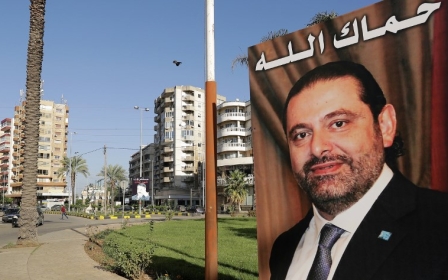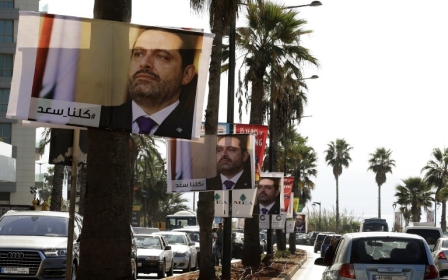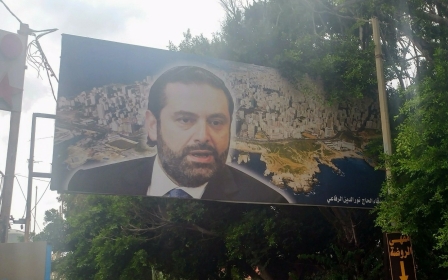Saudis forced out Hariri over refusal to tackle Hezbollah in Lebanon: Sources
Saad Hariri was forced by Saudi Arabia to step down as Lebanese prime minister earlier this month because of his unwillingness to confront Hezbollah, according to sources close to Hariri.
According to sources speaking to Reuters, Hariri believed he had convinced Saudi officials of the need to maintain an entente with Hezbollah for the sake of Lebanon's stability.
During a visit by Hariri to the kingdom prior to his resignation on 4 November, Prince Mohammed bin Salman had arranged for him to see senior intelligence officials and Gulf Affairs Minister Thamer al-Sabhan, the Saudi point man on Lebanon.
When Hariri's plane landed in Riyadh, he got the message immediately that something was wrong
- Source close to Hariri
Hariri came back to Beirut from that trip "pleased and relaxed", sources in his entourage said. He posted a selfie with Sabhan, both of them smiling. He told aides he had heard "encouraging statements" from the crown prince, including a promise to revive a Saudi aid package for the Lebanese army.
"What happened in those meetings, I believe, is that [Hariri] revealed his position on how to deal with Hezbollah in Lebanon: that confrontation would destabilise the country. I think they didn't like what they heard," said one of the sources, who was briefed on the meetings.
Rumours have swirled over the condition of Hariri since he announced his resignation in a statement from the capital Riyadh.
While Hariri cited the overwhelming influence of Iran and Hezbollah on Lebanese politics as the reason for his departure from office, there have been many indications that he is being kept against his will in Saudi Arabia.
"When Hariri's plane landed in Riyadh [on his subsequent visit on the weekend of 4 November], he got the message immediately that something was wrong," a Hariri source told Reuters.
"There was no one was waiting for him."
Freedom of movement
Multiple Lebanese sources say Riyadh hopes to replace Saad Hariri with his older brother, Bahaa, as Lebanon's top Sunni politician. Bahaa is believed to be in Saudi Arabia, and members of the Hariri family have been asked to travel there to pledge allegiance to him, but they have refused, the sources say.
Lebanese President Michel Aoun, a Hezbollah ally, told ambassadors to Lebanon that Saudi Arabia had kidnapped Hariri, a senior Lebanese official said. On Friday, France said it wanted Hariri to have "all his freedom of movement".
In his resignation speech, Hariri said he feared assassination and accused Iran and Hezbollah of sowing strife in the region. He said the Arab world would "cut off the hands that wickedly extend to it", language which one source close to him said was not typical of the Lebanese leader.
Hariri's resignation came as more than 200 people, including 11 Saudi princes, current and former ministers and tycoons, were arrested in an anti-corruption purge in Saudi Arabia.
Initially there was speculation Hariri was a target of that campaign because of his family's business interests. But sources close to the Lebanese leader said his forced resignation was motivated by Saudi efforts to counter Iran.
For his part, Hezbollah leader Hassan Nasrallah has accused Saudi Arabia of declaring war on Lebanon, and claimed that the kingdom had incited Israel to strike Lebanon.
"Saudi Arabia is inciting Israel to launch a war against Lebanon," said Nasrallah, in a televised speech on Friday.
Saudi Arabia is inciting Israel to launch a war against Lebanon
- Hassan Nasrallah, Hezbollah leader
"I speak here about facts, not analysis. Saudi Arabia is ready to pay tens of billions of dollars to Israel for that," he said.
Nasrallah also drew parallels between the current situation and 2006, when Hezbollah fought a devastating war with Israeli forces in southern Lebanon.
"We know now through Israeli media that the 2006 war on Lebanon was prolonged by Saudi when Israel wanted it to end."
Lebanon has long been a hub for proxy battles between Saudi Arabia, Iran and other regional players.
This article is available in French on Middle East Eye French edition.
Middle East Eye propose une couverture et une analyse indépendantes et incomparables du Moyen-Orient, de l’Afrique du Nord et d’autres régions du monde. Pour en savoir plus sur la reprise de ce contenu et les frais qui s’appliquent, veuillez remplir ce formulaire [en anglais]. Pour en savoir plus sur MEE, cliquez ici [en anglais].




